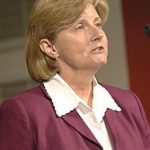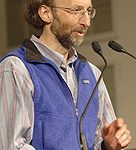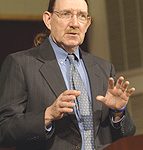Pam Kiser, Anthony Weston and Jim Pickens received top honors at Elon's annual faculty-staff awards luncheon, held Wednesday, May 9 in Koury Center. Details...
Kiser, Watts-Thompson Professor and professor of human services, was presented with the 2006-07 Daniels-Danieley Award for Excellence in Teaching. Kiser is the 35th winner of the award, established by President Emeritus J. Earl Danieley ’46 and his wife, Verona Daniels Danieley ’49, in honor of their parents.
 Kiser is a dedicated professor who is known for incorporating new ideas into her curriculum and bringing the “real world” to students. She encourages and challenges students to reach their potential inside and outside of class.
Kiser is a dedicated professor who is known for incorporating new ideas into her curriculum and bringing the “real world” to students. She encourages and challenges students to reach their potential inside and outside of class.
“She really expects a lot from us, but that challenged me to look into the issues deeper than I would have in a typical class,” one student writes. “I feel as though I got more out of class because of that.”
Kiser uses a teaching approach known as the “Study Circle,” in which open dialogue and different opinions are encouraged. Students say this challenges them to bring strong feelings into their conversations with others. “Professor Kiser is engaging, passionate and knowledgeable on the subject and really makes students think about the state of our world,” a student writes. “And then we take action, and I feel that is the most important part.”
For Kiser, teaching is not confined to the classroom. It is the focus of much of her research, particularly the use of service learning in academic contexts. Colleagues praise her Integrated Processing Model (IPM), which helps students develop their ability to engage in higher-level thinking and synthesize experiential and academic learning. It is widely used in North Carolina and the United Arab Emirates.
Kiser’s book, “Getting the Most From Your Human Service Internship: Learning from Experience,”emphasizes her commitment to service learning. She has also been awarded a Carnegie Grant and was a finalist for the 2005 Thomas Erlich Faculty Award for Service Learning.
Much of Kiser’s service to the institution is connected to improving the teaching of others. She is the Kernodle Center Service-Learning Faculty Development Fellow and is responsible for coordinating faculty workshops related to service learning. She is also a 2007-09 Center for Advancement of Teaching and Learning Scholar, with a project focusing on developing specific student learning goals for human services internships. “Pam is an exemplary faculty member who demonstrates the highest ideals of the Elon teacher-scholar,” colleagues write. “Her teaching is outstanding, and her scholarship and service are inextricably linked with her teaching.”
 Anthony Weston, professor of philosophy, was the recipient of the Distinguished Scholar Award. Weston is a prolific scholar who has written extensively about environmental ethics, environmental philosophy, social philosophy, philosophy of education, and critical and creative thinking. He has written nine books, including “A Rulebook for Arguments,” “A 21st Century Ethical Toolbox,” and “A Practical Companion to Ethics.” Two more books, “How to Re-Imagine the World: A Pocket Handbook for Practical Visionaries,” and “The Incompleat Eco-Philosopher: Essays on the Edges of Environmental Ethics,” are scheduled for publication later this year and next year.
Anthony Weston, professor of philosophy, was the recipient of the Distinguished Scholar Award. Weston is a prolific scholar who has written extensively about environmental ethics, environmental philosophy, social philosophy, philosophy of education, and critical and creative thinking. He has written nine books, including “A Rulebook for Arguments,” “A 21st Century Ethical Toolbox,” and “A Practical Companion to Ethics.” Two more books, “How to Re-Imagine the World: A Pocket Handbook for Practical Visionaries,” and “The Incompleat Eco-Philosopher: Essays on the Edges of Environmental Ethics,” are scheduled for publication later this year and next year.
Weston is the author of more than 50 articles that have been published in scholarly journals such Environmental Ethics, the Journal of Social Philosophy and Philosophy of Education. He is in demand as a lecturer and is a frequent participant at international conferences and symposia.
In 2002, Weston received the Daniels-Danieley Award for Excellence in Teaching, the university’s top teaching award. In 2004, he served as an invited visiting scholar in ecological philosophy at the Institute for Sustainability and Technology Policy at Murdoch University in Australia.
“Professor Weston is a stunningly accomplished intellect whose scholarship is deep, whose range is broad and whose life is well lived,” writes a colleague. “It is one of the tricks of serendipity that he is with us at Elon and it is very much to our good. I honor him and, honestly, look to Anthony as my role model.”
Another colleague writes, “Like a musician or painter, both talents that he possesses, Anthony Weston brings a freshness to all he touches, a surprising improvisational style together with a deep humanity and love of the earth as a primary site of embodied learning and service.”
The quality of Weston’s scholarship places him among the nation’s most renowned scholars in ethics, environmental ethics and philosophical pedagogy, writes another colleague. “His books are used by countless philosophers around this country making him, it is no exaggeration to say, the most visible member of the Elon faculty, as well as an important reason for the increased academic reputation of the university.”
Weston is the eighth recipient of the Distinguished Scholar Award, established in 2000 to recognize a faculty member whose research has earned peer commendation and respect and who has made significant contribution to his or her field of study.
 Jim Pickens, professor of psychology, received the Periclean Award for Civic Engagement and Social Responsibility. Pickens, who is retiring, has been a strong voice for peace and social justice since coming to Elon more than 20 years ago. He has served as advisor or co-advisor to Students for Peace and Justice throughout his Elon tenure, talking with students, bringing speakers to campus and providing direction to the organization. He served as coordinator of an NEH grant for Peace and Justice Studies, which evolved into the current Non-Violence Studies minor. He has taught courses on the psychology of non-violence and the psychology of American protest music.
Jim Pickens, professor of psychology, received the Periclean Award for Civic Engagement and Social Responsibility. Pickens, who is retiring, has been a strong voice for peace and social justice since coming to Elon more than 20 years ago. He has served as advisor or co-advisor to Students for Peace and Justice throughout his Elon tenure, talking with students, bringing speakers to campus and providing direction to the organization. He served as coordinator of an NEH grant for Peace and Justice Studies, which evolved into the current Non-Violence Studies minor. He has taught courses on the psychology of non-violence and the psychology of American protest music.
“The peace and justice slogans of the Sixties were not flower power fads for Jim,” writes a colleague. “He embodies the best of their sentiments. He is a leader, a true champion of ideals, who selflessly takes action to quell cruelty and injustice wherever he encounters it.”
His devotion to service and his fellow man reaches far beyond the Elon campus. He has traveled to Nicaragua and Guatemala as part of Witness for Peace trips, raising awareness about the United States’ role in injustice and inequality in Central America. He has been an active member of North Carolina Peace Action, the state branch of the nation’s largest peace organization.
“One of the primary messages of Jim’s teaching is that everyone has a right to be heard, be treated fairly, to be respected, and live life to the best of their abilities” another colleague says. “With this point, he not only forces students to think about ways of empowering others, but also ways in which they can work to empower themselves.”
Locally, he has been a leader of Alamance Peacemakers, volunteered as a mediator and assistant trainer at the Dispute Settlement Center and ministered to the homeless at a local shelter. He has taught English as a second language through Alamance Community College, worked with the Boy Scouts, coached youth soccer teams and been active in his church, Holy Comforter Episcopal Church.
“For Jim Pickens, everything is social responsibility,” writes another colleague. “Jim moves easily from the helpful, coaching a soccer team, to the palliative, helping out at the night shelter, to radical change, acts of solidarity with people in Nicaragua. Jim has done it all from Boy Scouts to dealing with the military in Nicaragua because he knows it will take his whole life and the lives of many more.”
Pickens is the fifth recipient of The Periclean Award, presented each year to a member of Elon’s faculty or staff whose service to the broader community exemplifies the ideals of Project Pericles.


